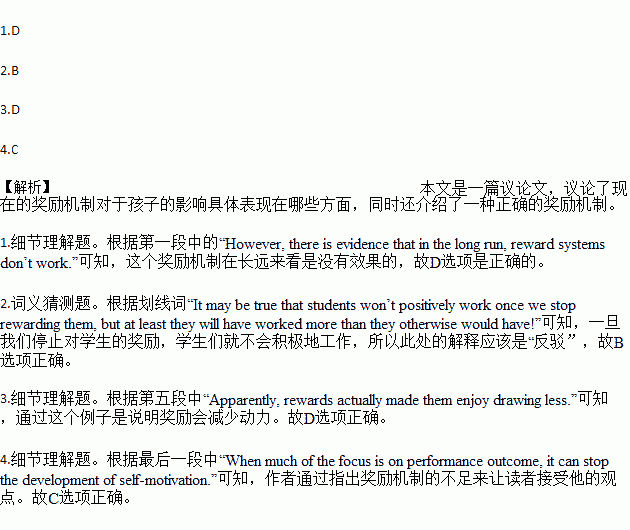题目内容
Reward methods are an everyday occurrence in our classrooms. More than ever, a great number of incentive(激励) programs have been created to help teachers manage behavior, and motivate learners. However, there is evidence that in the long run, reward systems don’t work.
Many people believe that rewards can help students develop a reason to do better. However, this approach fails to address why children are unable to be successful in the first place. When a student who dislikes math frequently behaves badly in class, a simple and easy way to deal with the behavior might be to offer him a reward for not misbehaving. Yet this would do nothing to solve his real problem—which is his attitude towards math.
On the other hand, rewards can’t last forever. So what happens when they stop? Many experiments suggest once the rewards stop, people go back to behaving as they did before.
Some people might counter that. It may be true that students won’t positively work once we stop rewarding them, but at least they will have worked more than they otherwise would have! Unfortunately, there is another more surprising consequence of rewards that we need to consider: Rather than create motivation, they can actually decrease motivation.
In a classic study, some kindergarteners who enjoyed drawing with markers were observed in a classroom with different activities available. They were broken into two groups. Everyone in the first group was told that he or she could win an attractive certificate by drawing a picture with markers. Each was eager to get the certificate and drew a picture. Children in the second group were also encouraged to draw but didn’t get a certificate. After a delay of about two weeks, when the markers again appeared in the classroom but no certificate was promised, the children in the first group used the markers about half as much as children in the second group. Apparently, rewards actually made them enjoy drawing less.
What we really want is for students to take responsibility for their own learning. When much of the focus is on performance outcome, it can stop the development of self-motivation. The ‘self-determination theory’ claims all human beings will succeed when our basic, inborn, and emotional needs are met. By providing appropriate support and opportunities, we can help to meet the needs of all students and therefore increase their motivation.
1.The author mainly argues that ________.
A. students should be responsible for their learning
B. incentive programs help to solve real problems
C. motivation plays an important role in learning
D. reward methods for students are ineffective
2.The underlined word “counter” in Paragraph 4 probably means ________.
A. suspect
B. oppose
C. detail
D. confirm
3.In Paragraph 5, the author uses the example to show that ________.
A. rewards keep interest
B. children enjoy awards
C. children are changeable
D. rewards reduce motivation
4.The author persuades readers to accept his argument mainly by ________.
A. questioning the results of classic studies
B. comparing strengths with weaknesses
C. pointing out the problems with reward systems
D. giving examples of badly-behaved students
 小学课堂作业系列答案
小学课堂作业系列答案 金博士一点全通系列答案
金博士一点全通系列答案

